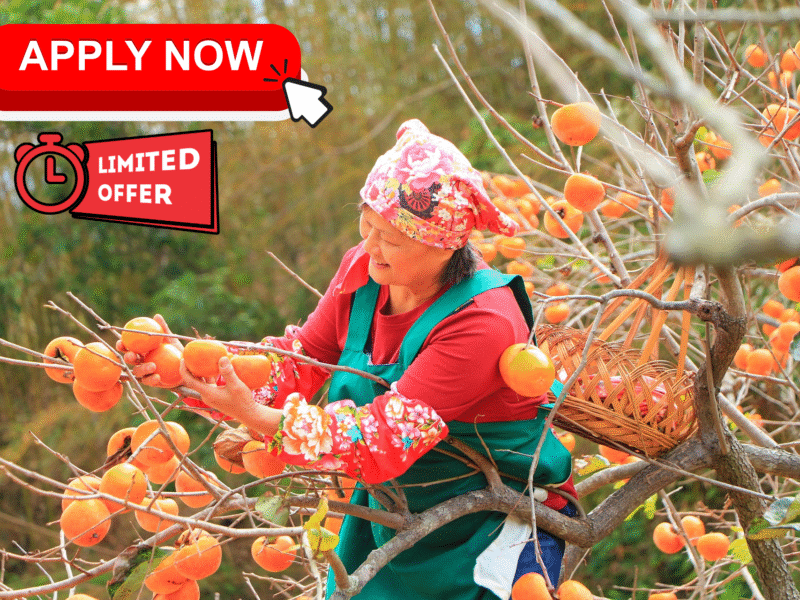Singapore is not just a financial powerhouse in Southeast Asia but also a destination for job seekers across various skill levels. One of the most accessible job sectors for foreigners, especially those looking for entry-level roles with minimal qualifications, is the fruit picking industry.
With a steady demand for seasonal agricultural workers, this sector is now actively recruiting immigrants who are ready to work diligently and enjoy added benefits such as free accommodation and visa processing.
In recent years, the government and private farms have partnered to ensure a stable workforce is maintained throughout harvesting seasons. With this comes a growing interest from foreign applicants hoping to land stable jobs with decent wages and additional perks.
Employers in this industry often sponsor work visas, making it easier for international candidates to settle into roles without the usual immigration hurdles. Furthermore, the inclusion of accommodation in employment packages reduces living expenses and provides workers with an immediate support system upon arrival.
Singapore’s climate allows for year-round cultivation, making fruit picking a consistent source of employment rather than just a seasonal task. Farms dealing in tropical fruits such as papaya, durian, banana, and pineapple require consistent manpower throughout the year.
This need opens a wide doorway for unskilled foreign laborers, particularly those from developing countries looking for employment in a safe and organized economy.
This article serves as a comprehensive guide for foreigners aiming to secure fruit picking jobs in Singapore. We will explore everything from required qualifications, expected salaries, and the best regions to work in, to companies currently hiring.
Most importantly, it covers the visa types and application processes involved, helping you understand what steps to take if you want to relocate and start earning in Singapore’s growing agricultural sector.
Entry-level Skills and Experience Required
One of the major advantages of fruit picking jobs in Singapore is that they require little to no formal education. Many employers are primarily looking for strong, reliable, and committed individuals who can handle the physical nature of the work.
Although prior farming or agricultural experience is appreciated, it is not mandatory, making this job category open to a wider pool of applicants, including those switching industries or fresh migrants seeking immediate employment.
Fruit picking typically involves tasks such as harvesting ripe fruits, pruning trees, loading produce into containers, and maintaining cleanliness in the work area. These tasks demand physical stamina, attentiveness, and the ability to work in humid or warm outdoor conditions.
Workers must often stand for long hours, bend repeatedly, and occasionally lift heavy containers filled with produce. Therefore, general fitness is one of the unspoken requirements in this industry.
Basic communication skills in English or Mandarin can be a bonus but are not always necessary, especially on larger farms that hire in groups and provide supervisors to translate instructions. Most of the necessary training is done on the job.
This includes lessons on fruit maturity, safe harvesting techniques, and sorting procedures. Employers are willing to invest in training because the fruit quality directly impacts the farm’s market price.
Another overlooked but valuable trait in this job is punctuality. Farms operate on tight schedules, especially during peak harvest periods, and delays can result in financial loss. Teamwork is also crucial, as tasks are often assigned in groups. Showing up on time, following directions, and being a team player are soft skills that go a long way in ensuring job stability.
The simplicity of the work means that even people with no prior experience can excel in fruit picking roles. Many successful workers today started without any background in agriculture but have been able to build long-term careers through consistency and dependability. This job often serves as a first step toward other employment opportunities in Singapore, especially for immigrants who intend to climb the economic ladder gradually.
Regions with the Highest Payment Structures
In Singapore, fruit picking work is primarily available in designated agricultural zones located on the outskirts of the city. These zones have been developed to support the country’s drive toward increased food security and self-sufficiency. Among them, areas like Lim Chu Kang, Kranji, and Neo Tiew stand out as key agricultural hubs offering some of the most rewarding opportunities for foreign fruit pickers.
Lim Chu Kang is one of the most developed agricultural areas in Singapore and hosts a variety of fruit farms. Workers in this region often receive higher wages due to the scale of the farms and the volume of produce handled.
Farms in Lim Chu Kang typically engage in export-oriented fruit cultivation, meaning quality control is strict, and compensation aligns with the high standards expected from international markets. Workers also enjoy structured shifts, access to better accommodation, and organized transport systems.
Kranji, known for its cluster of organic farms, provides fruit picking jobs that are slightly different. Since organic farming focuses on minimal chemical use and manual handling, laborers are often paid more for the extra care involved in harvesting.
Though the volume of work may be slightly less than in industrial-scale farms, the attention to detail makes each worker’s role more specialized, resulting in better wages and long-term employment prospects.
Neo Tiew is another up-and-coming region gaining attention in the agricultural job market. Several new farms have started operations here, offering both full-time and seasonal fruit picking jobs.
Because these are newer ventures, employers tend to be more competitive in terms of salary offerings to attract quality labor. Many of these farms also emphasize free accommodation and other perks like meal subsidies and bonus payments for overtime shifts.
Across all these regions, wages are slightly influenced by the type of fruit being harvested, the season, and the employment model (full-time vs. contract).
Workers should be mindful of farm size and production goals when choosing where to work, as these factors can determine workload and earnings. Nevertheless, these agricultural zones continue to provide stable income and decent living conditions for foreign workers seeking entry-level jobs in Singapore.
Salary Expectations for Fruit Pickers
The salary range for fruit pickers in Singapore depends on several factors, including the type of farm, hours worked, experience level, and even the time of year. However, for most foreign workers entering the industry, wages are competitive enough to cover personal expenses and still send money home.
On average, new workers can expect to earn between SGD 1,200 to SGD 1,800 per month. With added overtime and bonuses, monthly income can reach up to SGD 2,200 or more.
Farms operating on a larger scale typically pay more due to the volume of produce being harvested and exported. These farms also tend to have strict timelines, meaning that workers are encouraged to work longer shifts, which results in overtime pay.
Singapore’s labor laws require employers to pay for extra hours worked, and many fruit pickers benefit from this rule, especially during peak harvesting months.
For those who prove reliable and perform consistently, employers often offer salary increases within the first 6 to 12 months. Some companies implement productivity-based pay models where workers who harvest more fruits within the allotted time get bonuses or higher hourly rates. This merit-based structure gives foreign workers a chance to increase their earnings through hard work.
In addition to base salaries, free accommodation significantly reduces overall expenses. Accommodation provided by employers is typically shared, but it is clean, secure, and located near the farm or includes daily transport to and from the workplace. Some employers also cover basic utility bills and provide subsidized meals, allowing workers to save a larger portion of their wages.
Overall, while fruit picking may be physically demanding, it presents one of the best-paying entry-level job opportunities for foreigners in Singapore. Unlike many other labor-intensive jobs, the added value of visa support and housing makes it a financially sound option for immigrants aiming to start a better life abroad.
Companies Hiring Fruit Pickers in Singapore
Several agricultural firms and private farms across Singapore are actively seeking reliable foreign workers for fruit picking roles. These companies operate under licenses issued by the Singapore Food Agency and are known for offering visa sponsorship, fair wages, and housing provisions.
By partnering with international recruitment agencies, many of these employers have simplified the process for foreign nationals to enter Singapore legally and start working without delay.
One notable employer is Sky Greens, an innovative vertical farming company located in Lim Chu Kang. While they primarily grow leafy vegetables, they also maintain small orchards and regularly hire fruit pickers during certain seasons. They are known for offering stable work hours and comprehensive worker welfare programs.
Another well-established name in this space is Yili Farm, which operates large-scale fruit farms cultivating bananas, mangoes, and pineapples. Yili Farm is recognized for their robust worker training systems and clean living accommodations. Workers who show dedication and loyalty often get promoted to supervisory roles over time.
Jurong Farms, located near the Kranji area, is also a consistent recruiter of foreign labor. They are particularly active during the summer and holiday seasons when demand for local produce peaks. In addition to competitive salaries, they offer performance-based incentives and occasionally sponsor family reunification visas for long-term employees.
Many of these employers prefer to hire through certified recruitment agencies based in countries like India, Bangladesh, and the Philippines. These agencies help with documentation, interviews, and preliminary training. Applicants are encouraged to verify the legitimacy of the hiring company and ensure that all contracts are in line with Singapore’s Ministry of Manpower standards before proceeding.
The rising need for fresh produce, driven by both domestic consumption and export goals, ensures a continuous demand for fruit picking jobs. These companies not only offer fair employment but also help build long-term careers for foreigners aiming to grow economically while residing in Singapore.
Visa Types and Options for Fruit Pickers
Foreign workers looking to take up fruit picking jobs in Singapore will typically require either a Work Permit (WP) or an S Pass, depending on the job nature and employer’s hiring license. The most commonly issued visa for unskilled agricultural labor is the Work Permit, which is specifically designed for semi- and low-skilled workers from approved source countries.
The Work Permit allows employment for a period of up to two years, subject to renewal and employer sponsorship. One advantage of this visa is that it covers medical insurance and is tied directly to the employer, ensuring the worker’s stay is legally protected.
The employer also bears the responsibility for visa application fees, health checks, and initial accommodation arrangements, making the transition easier for foreign recruits.
Some specialized fruit farms may prefer to apply for the S Pass on behalf of experienced workers. The S Pass is granted to mid-level skilled workers and typically requires a higher monthly salary.
If a candidate has prior experience in farm operations or possesses relevant certifications, employers may choose this route, which offers a slightly longer stay validity and more flexibility in terms of job mobility.
To be eligible for either visa type, workers must be from countries approved by the Ministry of Manpower (MOM). Common source countries include India, Bangladesh, China, Thailand, and the Philippines.
All applicants must undergo a pre-departure medical examination and submit biometric data upon arrival. Employers usually take care of these arrangements, offering end-to-end visa processing at no cost to the worker.
Workers are advised to avoid illegal recruiters or unofficial channels when applying for these jobs. Singapore has strict immigration laws, and working without the correct visa can lead to deportation or blacklisting. Instead, candidates should work through official agencies or apply directly to licensed farms that are authorized to employ foreign labor.
Visa types for fruit picking jobs in Singapore are clearly structured and offer a transparent route to employment. The added benefit of visa sponsorship by employers makes this job sector especially attractive to those looking for legal, stable, and rewarding employment opportunities overseas.
Where to Find Fruit Picking Jobs Opportunities
The demand for fruit picking jobs in Singapore is visible across multiple employment platforms and recruitment agencies. Prospective candidates can find listings on popular Singapore-based job portals such as JobStreet, JobsCentral, and FastJobs.
These platforms regularly feature openings for agricultural laborers with details about wages, accommodations, and visa support.
Recruitment agencies play a major role in connecting foreign applicants to employers in Singapore. Agencies like E2I (Employment and Employability Institute), JobPlus, and Align Recruitment are known to manage large-scale hiring for the agriculture sector. They collaborate with farms that need seasonal labor and guide applicants through every stage, including documentation, interviews, and visa processing.
Word-of-mouth also remains a powerful way of discovering jobs in this sector. Many existing workers refer friends or family members to their employers, who are often open to hiring individuals from trusted sources. Employers tend to value recommendations because they come with an added layer of trust and reliability.
Social media platforms, particularly Facebook and Telegram, also host active groups where recruiters post job vacancies daily. Groups like “Jobs in Singapore for Foreigners” and “Singapore Farm Work Opportunities” serve as community-driven resources for job seekers worldwide.
While these platforms can be helpful, applicants must remain cautious and verify offers through official channels before committing.
International job boards like Indeed and Glassdoor also feature listings from Singaporean employers open to hiring foreigners. These platforms offer the advantage of reviews and ratings, which can help applicants assess the credibility of the employers before applying. Email alerts and filters make it easy to track new openings in the agricultural space.
Finding the right fruit picking job is not limited to one method. A combination of local job boards, certified agencies, and online communities increases your chances of finding a legitimate and well-paying job with visa sponsorship and housing benefits.
How to Apply for Fruit Picking Jobs as a Foreigner in Singapore
Applying for a fruit picking job in Singapore as a foreigner involves a few critical steps. First, you must identify job openings from credible sources such as government job portals, recruitment agencies, or the official websites of licensed farms. Once a position has been found, the application usually starts with submitting a resume and identification documents, including a valid passport.
After initial screening, many employers conduct virtual interviews to evaluate your interest, physical capacity, and willingness to work under the conditions specific to farm labor.
If shortlisted, the employer begins the visa application process, which involves submitting your details to the Ministry of Manpower (MOM) for a Work Permit or S Pass. You will also need to undergo a mandatory medical test before departure and again upon arrival in Singapore.
Candidates should ensure all employment contracts are signed before traveling. The contract should include details about wages, job responsibilities, accommodation, insurance coverage, and return ticket conditions.
It is also advisable to cross-check the employer’s registration with Singapore’s Accounting and Corporate Regulatory Authority (ACRA) and ensure the farm is licensed to employ foreign labor.
Recruitment agencies usually manage these formalities on behalf of the employer. These agencies will inform you of the timeline for processing your visa and the documents required, which typically include a passport, passport-size photos, academic records (if applicable), and prior work experience documents.
Upon arrival in Singapore, you will be met by a representative who will guide you to your accommodation and provide orientation about farm safety protocols, work hours, and local regulations. Many employers also assign a supervisor or translator to help foreign workers settle into the role.
Applying for fruit picking jobs in Singapore as a foreigner has never been easier, thanks to the structured visa system and employer support. With proper documentation, patience, and verification, job seekers can secure long-term employment with benefits that make the move worthwhile.






